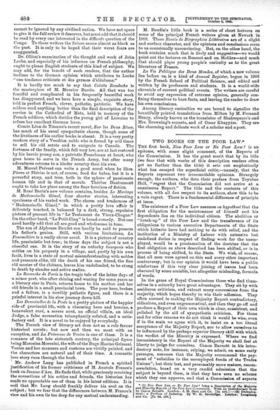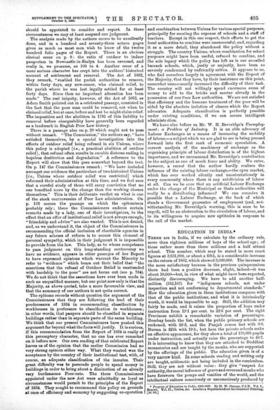TWO BOOKS ON TEE POOR LAW.*
THE first book, New Poor Law or No Poor Law ? is an epitome, with some slight comment, of the Reports of the Commission. It has the great merit that by its title (we fear that with works of this description readers often get no further than the title) it sets out emphatically what has escaped the superficial critic,—namely, that the Reports represent two irreconcilable opinions. Strangely enough, the authors, who date their preface from Toynbee Hall, "regret that the Commission did not arrive at a unanimous Report." The title and the contents of this volume, with all due respect to its authors, show this to be a vain regret. There is a fundamental difference of principle at issue.
The existence of a Poor Law assumes ex lrypothesi that the first obligation for the maintenance of himself and his dependents lies on the individual citizen. The abolition or " break-up " of the Poor Law and the transference of its obligations to various executive Departments of the State which hitherto have bad nothing to do with relief, and the institution of a Ministry of Labour with extensive but undefined duties in respect of finding work for the unem- ployed, would be a proclamation of the doctrine that the first obligation as above described has been shifted, or is in process of being shifted, to the State. We wish, of course, that all men were agreed on this and every other important controversy; but in our opinion it would have been a public misfortune if this very clear joining of issues had been obscured by some amiable, but altogether misleading, formula of words.
In the game of Royal Commissions those who find them- selves in a minority have great advantages. They sit by with. assiduous criticism, and extract many concessions from the majority, which hopes thereby to win their adhesion. They' often succeed in making the Majority Report contradictory, ridiculous, and even ungrammatical, and then they go off and produce a Report of their own which is clear, consistent, and polished by the aid of sympathetic criticism. For these and for other reasons we do not think it would be wise, even if in the main we agree with it, to insist on a too literal acceptance of the Majority Report, nor to allow ourselves to be influenced by the perhaps superior literary skill with which the verdict of the Minority is expressed. Where we find inconsistency in the Report of the Majority we shall feel at liberty to judge for ourselves. Canon Barnett in his intro- ductory note, for instance, relying, we admit, on some early passages, assumes that the Majority recommend the pay- ment of "subsidies to the unemployed funds of the Trades Unions"; but their last, and presumably more mature, recom- mendation, based on a very candid admission that the subject is beyond them, is that they have seen no scheme which they can approve, and that a Commission of experts
• (1) New Poor Law or Na Poor Law ? being a Description of But Majority and Minority Beperte f the Poor Law Cmansission. With an Introdnetery Note by Canon Barnett. London J. M. Dent and Co. [la. net.]—(2) Unemploy. meet: a Problem cf industry. By W. IL Beveridge. _ London: Longmasup and Co. [7e. 65. net.J
should be appointed to consider and report. In these circumstances we may at least suspend our judgment.
• The analysis made by the authors seems to be excellently done, and in a hundred and seventy-three octavo pages gives as much as most men wish to know of the twelve hundred folio pages of the Report. There is an obvious clerical error on p. 8: the ratio of outdoor to indoor pauperism in Newcastle-in-Emlyn has been reversed, and really is, we presume, as 100 to 4. Another error of a more serious character has crept into the authors' historical account of settlement and removal. The Act of 1662, they remark, "enabled the parish authorities to remove, within forty days, any new-corner, who claimed relief, to the parish where he was last legally settled for at least forty days. Since then no important alteration has been made." The real iniquity, however, of the Act of 1662, as Adam Smith pointed out in a celebrated passage, consisted in the fact that the poor man could be removed, not when he claimed relief, but at once, before and lest be might claim relief. The imposition and the abolition in 1795 of this liability to removal before chargeability have generally been regarded as a landmark in English Poor Law history.
There is a passage also on p. 20 which ought not to pass without remark. "The Commission," the authors say, "have satisfied themselves, by a special investigation into the effects of outdoor relief being refused in six Unions, where this policy is adopted [i.e., a practical aboliticn of outdoor relief] , that refusal often results in curable distress ending in hopeless destitution and degradation." A reference to the Report will show that this goes somewhat beyond the text. On p. 147 the Commissioners remark : "We have included amongst our evidence the particulars of two historical Unions [i.e., Unions where outdoor relief was restricted] which reformed their administration at this time, and we feel sure that a careful study of these will carry conviction that no one benefited more by the change than the working classes themselves." This is their deliberate verdict on what is one of the stock controversies of Poor Law administration. On p. 100 occurs the passage on which the epitomisers probably rely ; there the Commissioners endorse certain remarks made by a lady, one of their investigators, to the effect that an offer of institutional relief is not always enough; "friendship and advice" are also wanted. This is not denied, and, as we understand it, the object of the Commissioners in recommending the official inclusion of charitable agencies in any future scheme of reform is to secure this clement of personal sympathy, which in their judgment it is impossible to provide from the law. This lady, as to whose competence to pass judgment on this long-standing controversy we have no evidence, appears in other passages of her Report to have expressed opinions which warrant the Minority to refer to " evidence " which bears out their belief that "the assertions that the refusal of Outdoor Relief is unattended with hardship to the poor" are not borne out (see p. 764). We do not think that the assertions have ever been made in such an unqualified manner, but our point now only is that the Majority, as above quoted, take a more favourable view, and that the summary of our authors is not quite correct.
The epitome records without question the argument of the Commissioners that they are following the lead of their predecessors of 1834 in recommending classification by workhouses in preference to classification in workhouses ; in other words, that paupers should be classified in separate buildings rather than in separate parts of the same building. We think that our present Commissioners have pushed this argument far beyond what the facts will justify. It is curious, if this recommendation from the Report of 1834 is really of this peremptory character, that no one has ever remarked on it before now. Our own reading of that celebrated Report leaves us of the opinion that the earlier Commission had no very strong opinion either way. What they wanted was the acceptance by the country of their institutional test, with, of course, an adequate classification of the inmates. Their great difficulty was to persuade people to spend money in buildings in order to bring about a diminution of an already very burdensome Poor-rate. The three Commissioners appointed under the new Act were admittedly as loyal an circumstances would permit to the principles of the Report
of 1834. They sought to recommend this policy on grounds at-once of efficiency and economy by suggesting co-operation
and combination between Unions for various special purposes, principally for meeting the expense of schools and a staff of teachers. Except in this one respect, their efforts to get tho local authorities to combine were unsuccessful, and, regarding it as a mere detail, they abandoned the policy without a struggle. The country Unions, where combination for school purposes might have been useful, refused to combine, and the sole legacy which the policy has left us is our so-called barrack schools, which, justly or unjustly, have been so severely condemned by unfriendly critics. It appears to us, who find ourselves largely in agreement with the Report of the Majority, that they have, by their insistence on this point, somewhat unnecessarily increased the difficulty of their task. The country will not willingly spend enormous sums of money to add to the bricks and mortar already in the possession of our Poor Law authorities. We are not satisfied that efficiency and the humane treatment of the poor will be aided by the absolute isolation of classes which the Report advocates. Adequate classification is perfectly possible under existing conditions, if we can secure intelligent administration.
We have also before us Mr. W. H. Beveridge's Unemploy- ment: a Problem of Industry. It is an able advocacy of Labour Exchanges as a means of increasing the mobility of labour,—a subject which we are glad to see is being pressed forward into the first rank of economic speculation. A correct analysis of the machinery of exchange as the organising principle of labour distribution is of the highest importance, and we recommend Mr. Beveridge's contribution to the subject as one of much force and ability. We enter, however, a caveat that the author hardly realises the influence of the existing labour exchange,—the open market, which has ever worked silently and unostentatiously in every community where there is any subdivision of labour at all. Can we be sure that an artificial Labour Exchange under the charge of the Municipal or State authorities will really be a distributing influence? We can conceive it possible that a Labour Exchange, at the back of which stands a Government guarantee of employment (and, not- withstanding Mr. Beveridge's warning, this is sure to be urged), will be an obstruction to the circulation of labour, and to its willingness to acquire new aptitudes in response to the call of the market.



























































 Previous page
Previous page